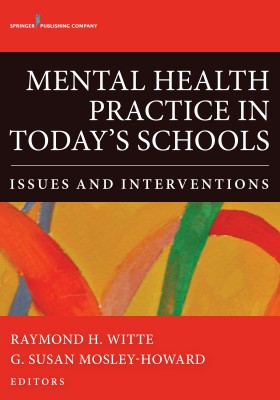 Public schools today face an ever-increasing array of issues that impact both the school climate and the overall mental health of students at all levels—elementary, middle and high. In order to identify these issues and provide successful, research-based interventions, Raymond H. Witte and G. Susan Mosley-Howard have brought together practitioners and experts in the field to present a concise yet comprehensive resource to assist both school support professionals and clinical mental health practitioners who work with school-age children. Mental Health Practice in Today’s Schools: Issues and Interventions provides essential guidance in serving the mental health needs of all students.
Public schools today face an ever-increasing array of issues that impact both the school climate and the overall mental health of students at all levels—elementary, middle and high. In order to identify these issues and provide successful, research-based interventions, Raymond H. Witte and G. Susan Mosley-Howard have brought together practitioners and experts in the field to present a concise yet comprehensive resource to assist both school support professionals and clinical mental health practitioners who work with school-age children. Mental Health Practice in Today’s Schools: Issues and Interventions provides essential guidance in serving the mental health needs of all students.
The first part of the book focuses on core professional topics that help facilitate the role of mental health practitioners in schools’ student support services. Because Response to Intervention has become a focal point for the identification of special-needs populations and of students with chronic behavioral challenges, procedures are presented for screening at-risk students for mental health intervention, as well as for integrating mental health programs within the school community. Authors also discuss how to use counseling microskills more effectively with children of varying developmental levels. In addition, two of the more widely-used and successful theoretical approaches in working with school-age populations, reality therapy and solution-focused brief therapy, are presented by acknowledged experts in the field—Robert Wubbolding and Cynthia Franklin, respectively.
As many educators working in the schools may not be familiar with disorders commonly diagnosed in the school-age population, authors identify these disorders and provide strategies for presenting this information effectively to teachers, administrators and other student support personnel. Likewise, authors offer guidance on legal and ethical considerations when providing mental health services to children and adolescents within the school environment.
Specific issues encountered by educators and mental health professionals working in the schools are addressed in the second part of the book. Bullying is an international phenomenon, and this text provides interventions for assisting both the aggressor and the target of the bullying behavior. School staff members often have a particularly difficult time in developing effective strategies to combat cyberbullying, which is bullying by means of electronic devices and social media. This behavior can cross school boundaries, making it difficult to pursue due to students’ rights to privacy and free speech, and to the extent of the school’s authority to legally intervene. However, bullying can be linked to other issues such as physical or sexual abuse, substance abuse, and suicide, and as such, authors provide suggestions for addressing each of these challenges for school crisis prevention and intervention by mental health professionals working in the schools.
Although some of the information presented by the various authors is more technical in nature, I found this book to be informative, novel in its choice of subjects, and a user-friendly read for practitioners and educators alike. Such topics as student threat assessment and psychopharmacology are necessary but seldom included in mental health practice texts relative to the public schools, making this book a much more comprehensive text for use not only by practitioners but also in the preparation of students in training for the mental health professions. A particular strength of this book is that the authors are drawn from various fields and professional perspectives—psychology, psychiatry, social work, mental health counseling and public education. The text’s only limitation is that I would have liked to see a more prominent emphasis on collaboration with existing student services members, such as school counselors, in support of mental health interventions within the school environment.
Overall, Mental Health Practice in Today’s Schools: Issues and Interventions provides a comprehensive guide to the mental health issues of students in our schools and practical school-wide prevention and intervention strategies to address these challenges. This text will likely serve as an essential resource for mental health practitioners and educators working in the schools for years to come.
Witte, R. H., & Mosley-Howard, G. S. (Eds.). (2015). Mental health practice in today’s schools: Issues and interventions. New York, NY: Springer.
Reviewed by: Michael A. Keim, NCC, Columbus State University, Columbus, GA.
The Professional Counselor
